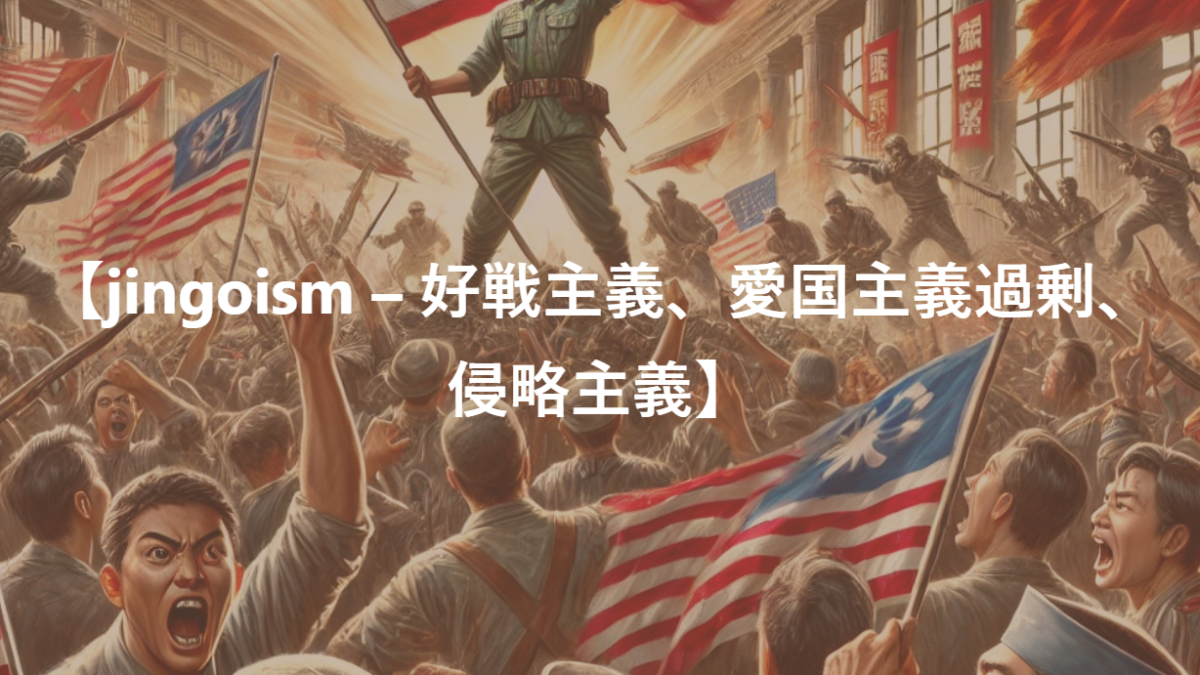派生語・語源・類義語・反対語・例文
派生語や動詞の活用
派生語や関連語
- Jingoistic:
- これは”jingoism”の形容詞形で、過激な愛国心や敵対的な国家主義を表現したり、そのような特性を持つ人や物を説明するのに使います。
- Jingoist:
- これは”jingoism”の名詞形で、過激な愛国心や敵対的な国家主義を持つ人を指します。
- Jingoistically:
- これは”jingoism”の副詞形で、過激な愛国心や敵対的な国家主義を表す行動や態度で、という意味で使われます。
【jingoism – 好戦主義、愛国主義過剰、侵略主義】という単語の語源とか由来を知っていますか?
「Jingoism」は、19世紀のイギリスで使われた用語で、歌詞に登場するキャッチフレーズ「by jingo!」に由来しています。この表現は当時の愛国的な感情や好戦的な態度を象徴しており、「jingo」は当時の愛国的な歌や行進曲の中で使われていました。その後、「jingoism」は国家主義的な傾向や過剰な愛国心、侵略的な態度を指す言葉として広まりました。
19世紀のイギリスでは、「jingoism」が好戦的な外交政策や侵略的な姿勢を象徴する言葉として使われました。特に、外交紛争や国際的な緊張の高まりを反映する言葉として注目されました。この言葉はその後も国際的な政治や外交関係において、過剰な愛国心や好戦的な姿勢を批判的に指摘する際に使用されることがあります。
この単語の類義語・反対語を教えてください。
類義語:
- Nationalism(国家主義)
- Chauvinism(優越感、排他的な愛国心)
反対語:
- Pacifism(平和主義)
- Internationalism(国際主義)
この単語を使った例文を5つほど教えてください。
- The leader’s speeches were filled with jingoism, promoting aggressive foreign policies. (その指導者の演説は好戦的な愛国心に満ちており、攻撃的な外交政策を推進していました。)
- The country’s history is marked by periods of jingoism, leading to conflicts with neighboring nations. (その国の歴史は、好戦的な愛国心が高まる時期があり、隣国との紛争を引き起こしました。)
- Critics accused the government of using jingoism to rally public support for military interventions. (批評家たちは、政府が好戦的な愛国心を利用して軍事介入への公衆の支持を図っていると非難しました。)
- The rise of jingoism often coincides with times of economic instability and insecurity. (好戦的な愛国心の増加は、しばしば経済的な不安定や不安な時期と重なります。)
- The newspaper editorial criticized the government’s jingoistic rhetoric as harmful to international cooperation. (新聞の社説は、政府の好戦的な retoric は国際協力にとって害になると批判しました。)
コロケーション
- Rising jingoism
意味: 高まる好戦主義 - Political jingoism
意味: 政治的な好戦主義 - Nationalistic jingoism
意味: 国家主義的な好戦主義 - Jingoistic rhetoric
意味: 好戦的なレトリック - Cultural jingoism
意味: 文化的な侵略主義 - Military jingoism
意味: 軍事的好戦主義 - Excessive jingoism
意味: 過度な愛国主義
「Jingoism」という言葉は、好戦的な愛国主義や侵略主義を表すもので、これに関連するコロケーションは多くあります。まず、Rising jingoismですが、これは「高まる好戦主義」を意味し、特定の国や集団で好戦的な態度が強まる状況を指します。次に、Political jingoismというコロケーションは「政治的な好戦主義」を意味し、特に政治的な文脈で、過剰な愛国心や侵略的な政策を推進することを指します。
また、Nationalistic jingoismは「国家主義的な好戦主義」という意味で、愛国心が強調されすぎて他国への敵対心に繋がる状況を指します。Jingoistic rhetoricは「好戦的なレトリック」を意味し、戦争や対立を煽るような言葉や主張を指します。
さらに、Cultural jingoismというコロケーションは「文化的な侵略主義」を意味し、ある文化が他の文化に対して優位に立とうとする好戦的な態度を指します。そして、Military jingoismは「軍事的好戦主義」で、軍事力を誇示して侵略的な行動を取ろうとする考え方を指します。最後に、Excessive jingoismは「過度な愛国主義」を意味し、極端なまでに自国やその価値観を他国に押し付ける態度を示します。
The word “jingoism” refers to aggressive patriotism or imperialism, and there are many related collocations. First, Rising jingoism refers to “increasing aggressive nationalism,” describing a situation where warlike attitudes are becoming stronger in a specific country or group. Next, the collocation Political jingoism means “political jingoism,” referring to the promotion of overly patriotic or imperialistic policies, particularly in a political context.
Additionally, Nationalistic jingoism refers to “nationalistic jingoism,” which describes a situation where patriotism is exaggerated to the point of fostering hostility toward other nations. Jingoistic rhetoric means “warlike rhetoric,” and it refers to words or statements that incite conflict or war.
Furthermore, Cultural jingoism refers to “cultural imperialism,” where one culture adopts an aggressive stance in asserting dominance over another culture. Military jingoism means “military jingoism,” which describes a mindset of displaying military power and pursuing aggressive military actions. Finally, Excessive jingoism refers to “extreme patriotism,” indicating a highly exaggerated form of nationalism where one’s values and beliefs are forcibly imposed on other nations.
Jingoismを使った英文法問題5問
- The politician’s _____ rhetoric stirred up nationalistic fervor and a desire for military action.
- (A) jingoism
- (B) jingoistic
- (C) jingoistically
- (D) jingo
- The newspaper’s _____ editorials often promoted aggressive foreign policies and demonized other nations.
- (A) jingoism
- (B) jingoistic
- (C) jingoistically
- (D) jingo
- 解説: 空欄には名詞(editorials)を修飾する形容詞が必要です。jingoistic は「好戦的な、愛国主義過剰の」という意味の形容詞です。
- The rise of _____ in the country led to increased military spending and a more aggressive stance towards its neighbors.
- (A) jingoism
- (B) jingoistic
- (C) jingoistically
- (D) jingo
- 解説: 空欄には主語(rise)の後に続く名詞が必要です。jingoismは「好戦主義、愛国主義過剰」という意味の名詞です。
- The historian warned against the dangers of _____, arguing that it could lead to unnecessary conflict and war.
- (A) jingoism
- (B) jingoistic
- (C) jingoistically
- (D) jingo
- 解説: 前置詞(of)の後に名詞が必要です。jingoismは「好戦主義、愛国主義過剰」という意味の名詞です。
- The general’s _____ speeches often appealed to the emotions of the soldiers, encouraging them to fight for their country.
- (A) jingoism
- (B) jingoistic
- (C) jingoistically
- (D) jingo
- 解説: 空欄には名詞(speeches)を修飾する形容詞が必要です。jingoistic は「好戦的な、愛国主義過剰の」という意味の形容詞です。

